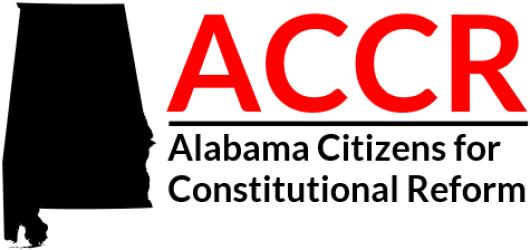ACCR is excited to announce the launch of a joint project with the Public Affairs Research Council of Alabama. See the details below and please consider helping us fund this important research by donating on our website under the Contributions tab.
The Alabama Constitution Reformed: Is There Still Work to Do?
In 2022, Alabama adopted a “new” constitution, an improved and reorganized version of the Alabama Constitution of 1901. The vote was the culmination of decades of advocacy and was rightly celebrated.
The new Constitution removed the racist and unconstitutional provisions that were relics of the White Supremacist 1901 Constitution.
It reorganized the document, moving relevant statewide amendments into their proper place in the main body of the Constitution, removing duplicative and repealed provisions, and organizing local constitutional amendments by county to the end of the document.
But is the work finished?
Is Alabama free from the shackles of the anti-democratic and pre-modern Constitution of 1901? Or are fundamental flaws still embedded in our Constitutional DNA?
Despite the new Constitution, we remain governed by the basic operating system established by the 1901 Constitution. And that operating system was recognized as obsolete and an obstacle almost as soon as it was adopted.
Alabama Governor Emmet O’Neal, in a 1914 address, observed, “No real or permanent progress is possible in Alabama until the present fundamental law is thoroughly revised and adapted to meet present conditions.”
Have those revisions been made? In this election year, the Public Affairs Research Council of Alabama (PARCA) will examine that question.
PARCA was founded to provide objective, non-ideological research to citizens and leaders, supporting the improvement of state and local governments. PARCA research is intended to help governments function efficiently and effectively in hopes that those governments provide equal treatment and opportunity to the people of Alabama.
As the Constitution is fundamental to the functioning of state and local governments, it has been a central focus of PARCA’s work.
Over the next year, PARCA will issue a series of reports examining Alabama’s current constitutional framework, identifying remaining obstacles to a modern constitution and possible paths forward in areas such as education, economy, healthcare, democracy, liberty & justice, finances, and related areas.
The project is supported, in part, by the Alabama Citizens for Constitutional Reform (ACCR). Both ACCR and PARCA are nonpartisan organizations, and our members and supporters are Republicans, Democrats, and independents. Former Governor Albert Brewer and former Samford University President Thomas Corts, both deceased, were founding leaders in both organizations.
The mission of ACCR is to educate and advocate for an Alabama Constitution that protects and enhances life for all Alabama citizens. To that end, ACCR has two branches:
- A foundation that focuses on educating the public about the Alabama Constitution and underlying issues that affect our citizens.
- A nonprofit advocacy organization that works to improve the Constitution.
The foundation is providing support for PARCA’s re-examination of the Alabama Constitution. ACCR’s advocacy organization will use the research to recalibrate its ongoing work on Constitutional reform.
Alabama’s Constitution of 2022 is still, by far, the longest state constitution in the United States, three times as long as the next longest state constitution. Though now better organized, it is still complex and contradictory.

It is not a basic template and statement of principles, which should be the ideal. It more closely resembles a law code, with almost 500 pages worth of amendments that relate to localities rather than to the state as a whole.
Alabama voters have finally removed the most noxious provisions of the Constitution of 1901, which was explicitly formulated to strip the political rights of Black Alabamians, but which also disenfranchised poor whites. Gone are provisions that mandated segregated schools. Deleted are provisions allowing for involuntary servitude for those convicted of crimes. The Constitution now recognizes that females have a right to vote.
But other aspects of the Constitution remain unchanged. Power is still concentrated in the hands of the state Legislature in Montgomery. Should that power be more dispersed? Should citizens be able to initiate change and call for referendums, rights available to citizens in other states? Should more decisions be made by local communities rather than by legislators in Montgomery?
Alabama still collects less in state and local taxes than virtually any other state through a constitutionally-embedded tax system that falls disproportionately on poor Alabamians. At the same time, low taxes, particularly on property, reflect voters’ preferences. Are there changes voters would support that could increase adequacy and fairness?
Thanks to the Constitution, Alabama still earmarks more revenue than any other state. That limits legislators’ ability to shift revenue toward pressing priorities. On the other hand, voters like earmarks and don’t necessarily trust lawmakers. Is there a way to change the culture of distrust with changes that increase both flexibility and accountability?
Does the Constitution inhibit economic development and mass transportation? Does it promote public safety and justice? Does it adequately promote the general welfare, health, and education?
Alabama’s Constitution should reflect our values. It should promote engagement in our democracy and free and fair elections. It should provide for equality of opportunity and equal treatment under the law. With the adoption of the Constitution of 2022, the people of the state took a step forward, removing obvious anti-democratic and discriminatory provisions left from a darker past.
But does the Constitution reflect the needs and aspirations of Alabamians today? Does it provide us with the outlines of a modern, efficient, effective, and responsive government? Is there still a need for Constitutional reform? We will explore those questions in the months to come.
